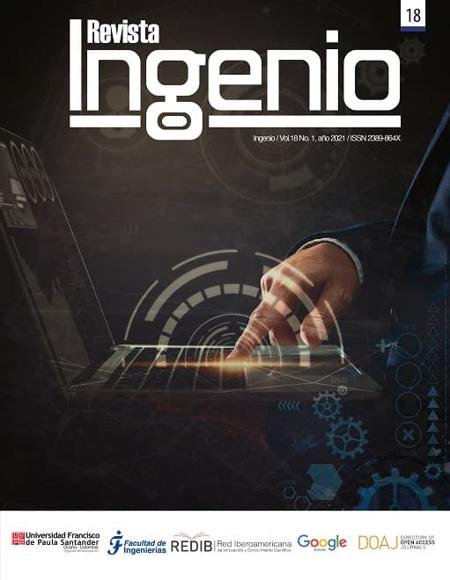Energy management system under the Industry 4.0 paradigm
Sistema de gestión de energía bajo el paradigma de Industria 4.0
Main Article Content
Energy management is one of the fundamental elements in industrial processes and a standard has been established for the search for efficiency through a process of continuous improvement called ISO 50001. At the same time, the manufacturing industry has generated new schemes for the improvement of energy global efficiency of the company and the Industry 4.0 paradigm has appeared. The concept of Industry 4.0 (I4.0) is based on a holistic view of the production process. Industry 4.0 has incorporated it in the search to have green manufacturing companies. The paradigm is very demanding in terms of having information based on models that are not always present in Small and Medium Industries. The work shows how to achieve continuous improvement compliance within the framework of I 4.0.
Downloads
Article Details
Lasi, H., Fettke, P., Kemper, H. G., Feld, T., & Hoffmann, M. (2014). Industry 4.0. Business & information systems engineering, 6(4), 239-242.Doi: 1007/s12599-014-0334-4
Stock, T., & Seliger, G. (2016). Opportuni-ties of sustainable manufacturing in indus-try 4.0. Procedia Cirp, 40, 536-541.Doi: 10.1016/j.pro-cir.2016.01.129
Bartodziej, C. J. (2017). The concept indus-try 4.0. In The concept industry 4.0 (pp. 27-50). Springer Gabler, Wiesbaden.Doi: 10.1007/978-3-658-16502-4_3
Kamble, S. S., Gunasekaran, A., & Gawankar, S. A. (2018). Sustainable Indus-try 4.0 framework: A systematic literature review identifying the current trends and future perspectives.Process Safety and Envi-ronmental Protection, 117, 408-425. Doi: 10.1016/j.psep.2018.05.009
Mohamed, N., Al-Jaroodi, J., & Lazarova-Mol-nar, S. (2019). Leveraging the capabili-ties of industry 4.0 for improving energy efficiency in smart factories. Ieee Access, 7, 18008-18020. Doi: 0.1109/ACCESS.2019.2897045
Carvalho, N., Chaim, O., Cazarini, E., & Gerola-mo, M. (2018). Manufacturing in the fourth indus-trial revolution: A positive pro-spect in sustaina-ble manufacturing. Proce-dia Manufacturing, 21, 671-678. Doi: 10.1016/j.promfg.2018.02.170
Trentesaux, D., Borangiu, T., & Thomas, A. (2016). Emerging ICT concepts for smart, safe and sustainable industrial systems. Com-puters in Industry, 81, 1-10. Doi: 10.1016/j.compind.2016.05.001
Schweichhart, K. (2016). Reference archi-tectur-al model industrie 4.0 (rami 4.0). An Introduction.Available online: https://www.plattform-i40.deI,40
Revista Electro Industria.ARQUITEC-TURAS DE REFERENCIA RAMI 4.0 E IIRA Una cuestión de perspectiva y enfoquehttp://www.emb.cl/electroindustria/articulo.mvc?x-id=2856&ni=arquitecturas-de-referencia-ra-mi-40-e-iira-una-cuestion-de-perspectiva-y-en-foque
Glass, R., Meissner, A., Gebauer, C., Stürmer,S. & Metternich, J. “Identifying the barriers to Industrie 4.0”, Procedia CIRP, vol. 72, pp 985 –988, 2018.
Mittal, S., Khan, M. A., Romero, D., & Wuest, T. “A critical review of smart manu-facturing & Industry 4.0 maturity models: Implications for small and medium-sized enterprises (SMEs)”, Journal of Manufac-turing Systems, vol. 49, pp 194 – 214, 2018
E. A. Chacón, J. J. Cardillo & J. Uribe, “Industria 4.0 en América Latina: Una ruta para su implant-ación”, Revista Ingenio, 17 (1), pp.28-35, 2020. Doi: 10.22463/2011642X.2386
Thimm, H. (2018). Energy Data Managment in an Eco Learning Factory with Traditional SME Characteristics. In From Science to Society. 95-105. Springer, Cham Doi; 10.1007/978-3-319-65687-8_9.
Yacob, P., Maludin, N., Aziz, N. S., Nodesan, S., Zin, A. W. M., & Keong, L. E. (2018). Accepta-bility of sustainable green practices: perception of electrical & elec-tronics manufacturing SMEs. Chemical En-gineering Transactions, 63, 319-324. Doi: 10.3303/CET1863054
Fernando, Y., & Hor, W. L. (2017). Im-pacts of energy management practices on energy efficien-cy and carbon emissions re-duction: a survey of Malaysian manufactur-ing firms. Resources, Conservation and Re-cycling, 126, 62-73. Doi: 10.1016/j.resconrec.2017.07.023
Thorsten Fiedler and Paul-Mihai Mircea. Ener-gy management 130 systems according to the iso 50001 standard – challenges and benefits. In 2012 International Conference on Applied and Theoretical Electricity (ICATE), pages 1–4. IEEE, 2012. Doi: 0.1109/ICATE.2012.6403411
Javied, T., Huprich, S., & Franke. J. Cloud based energy management system compati-ble with the industry 4.0 requirements. IFAC-PapersOnLine, 52(10):171 – 175, 2019. 13th IFAC Workshop on Intelligent Manufacturing Systems IMS 2019. Doi 10.1016/j.ifacol.2019.10.018
ISO. ISO 50001:2011. Sistemas de gestión de la energía - Requisitos con orientación para su uso. Leído en https://www.iso.org/obp/ui/#iso:st-d:iso:50001:ed-1:v1:es
Supekar, S. D., Graziano, D. J., Riddle, M. E., Nimbalkar, S. U., Das, S., Shehabi, A., & Cresko, J. (2019). A Framework for Quantifying Energy and Productivity Bene-fits of Smart Manufactur-ing Technologies. Procedia CIRP, 80, 699-704. Doi: 10.1016/j.procir.2019.01.095
Chacón-Ramirez, E., Zapata-Madrigal, G., & Uribe-Hernández, J. An architecture for energy management in SMEs. Reporte Técnico de SI-MAC. Enviada para su evaluación.
Mohamed, N., Al-Jaroodi, J., & Lazarova-Mol-nar, S. (2019). Leveraging the capabili-ties of industry 4.0 for improving energy efficiency in smart factories. Ieee Access, 7, 18008-18020. Doi: 10.1109/ACCESS.2019.2897045
Faller, C., & Feldmüller, D. (2015). Indus-try 4.0 learning factory for regional SMEs. Procedia Cirp, 32, 88-91. Doi: 10.1016/j.procir.2015.02.117.
Zhang, M.; Zuo, Y. & Tao, F. (2018). Equipment energy consumption manage-ment in digital twin shop-floor: A frame-work and potential applica-tions 2018 IEEE 15th International Conference on Network-ing, Sensing and Control (ICNSC), 1-5







